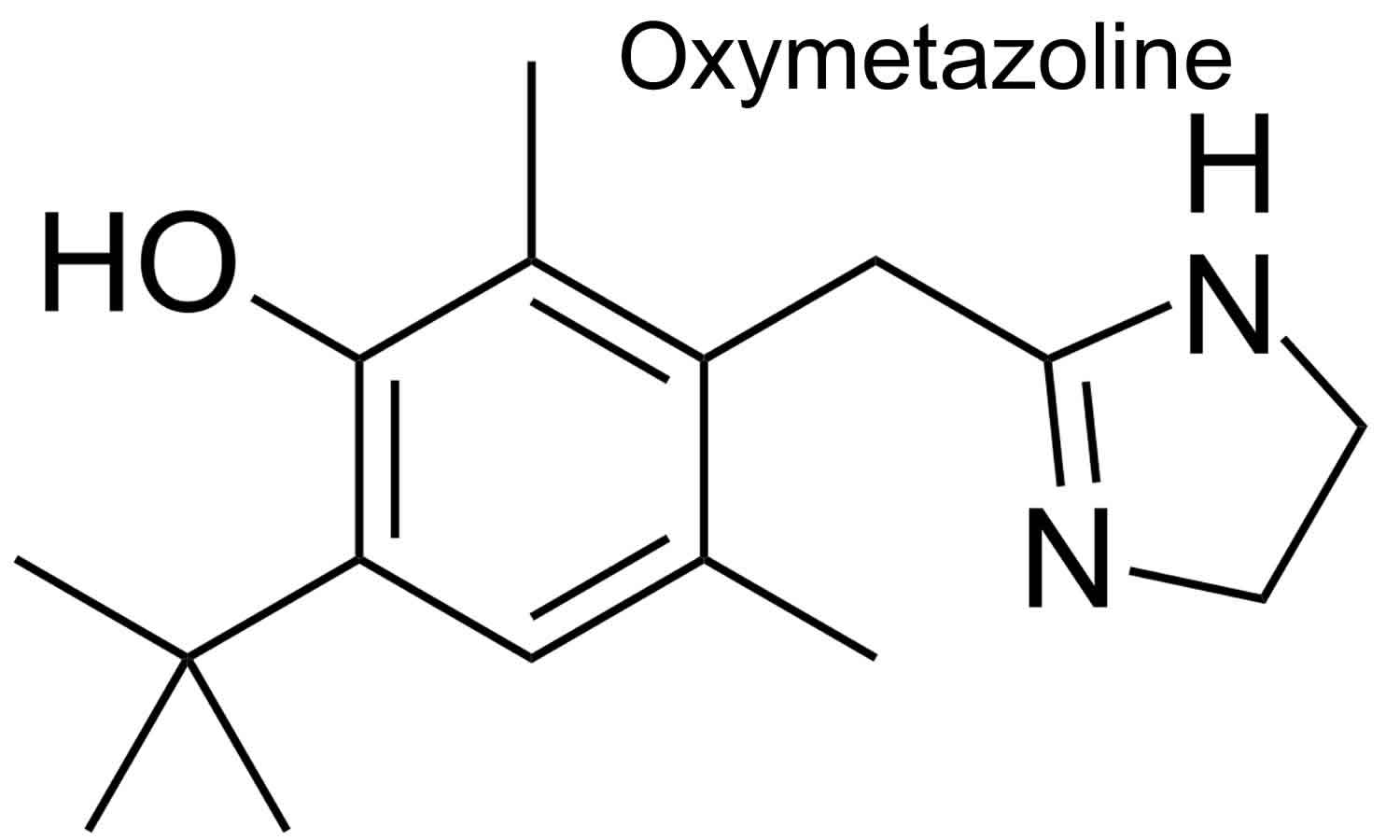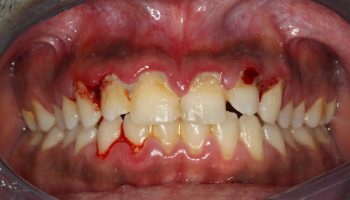Oxymetazoline nasal spray
Oxymetazoline is a a direct acting sympathomimetic vasoconstrictor that works by narrowing swollen blood vessels. Oxymetazoline works by narrowing the blood vessels in your nasal passages. Oxymetazoline is in a class of medications called alpha1A adrenoceptor agonists that works as nasal decongestant. Oxymetazoline nasal spray is used for the temporary relief of nose congestion or stuffiness caused by hay fever or other allergies, colds, or sinus trouble. Oxymetazoline nasal spray is available without a prescription.
Oxymetazoline nasal spray is used to relieve nasal discomfort caused by colds, allergies, and hay fever. Oxymetazoline nasal spray is also used to relieve sinus congestion and pressure. Oxymetazoline nasal spray should not be used to treat children younger than 6 years of age unless it is recommended by a doctor. Children 6 to 12 years of age should use oxymetazoline nasal spray carefully and under adult supervision.
How should oxymetazoline nasal spray be used?
Oxymetazoline comes as a solution (liquid) to spray into the nose. Oxymetazoline nasal spray is usually used every 10 to 12 hours as needed, but not more often than twice in a 24-hour period. Follow the directions on the package label or on your prescription label carefully, and ask your doctor or pharmacist to explain any part you do not understand. Use oxymetazoline nasal spray exactly as directed. Do not use more or less of it or use it more often than prescribed by your doctor or directed on the label.
To use the nasal spray:
- Blow your nose gently. Keep your head upright and insert the tip of bottle into one nostril. Press your other nostril closed with your finger. Breathe in quickly and gently spray the medicine into your nose. Then use the spray in your other nostril.
- Do not blow your nose for at least a few minutes after using the nasal spray.
- Do not use the nasal spray more than 2 times in 24 hours.
Wipe the tip of the spray bottle with a clean tissue but do not wash with water or soap.
Store at room temperature away from moisture and heat. Do not freeze. Keep the bottle tightly closed when not in use.
If you use oxymetazoline nasal spray for more often or for longer than the recommended period of time, your congestion may get worse or may improve but come back. Do not use oxymetazoline nasal spray for longer than 3 days. If your symptoms do not get better after 3 days of treatment, stop using oxymetazoline and see your doctor.
Oxymetazoline nasal spray is only for use in the nose. Do not swallow the medication.
To prevent the spread of infection, do not share your spray dispenser with anyone else. Rinse the tip of the dispenser with hot water or wipe it clean after you use it.
Follow the directions for using the nasal spray that appear on the package label. If you are using a product that comes in a pump dispenser, press down on the rim several times before using your first dose to prime the pump, according to the directions on the label. When you are ready to use the spray, hold your head upright without tilting and place the tip of the bottle in your nostril. For the nasal spray, squeeze the bottle quickly and firmly. For products that come in a pump dispenser, press down on the rim with a firm, even stroke and breathe in deeply.
Oxymetazoline nasal spray special precautions
Before using oxymetazoline nasal spray:
- tell your doctor and pharmacist if you are allergic to oxymetazoline, or any other medications.
- tell your doctor and pharmacist what prescription and nonprescription medications, vitamins, nutritional supplements, and herbal products you are taking or plan to take. Be sure to tell your doctor or pharmacist if you are taking the following medications or have stopped taking them within the past two weeks: isocarboxazid (Marplan), phenelzine (Nardil), selegiline (Eldepryl, Emsam, Zelapar), and tranylcypromine (Parnate).
- tell your doctor if you have or have ever had high blood pressure, diabetes, difficulty urinating due to an enlarged prostate gland, or thyroid or heart disease.
- tell your doctor if you are pregnant, plan to become pregnant, or are breast-feeding. If you become pregnant while using oxymetazoline nasal spray, call your doctor.
Allergies
Tell your doctor if you have ever had any unusual or allergic reaction to this medicine or any other medicines. Also tell your health care professional if you have any other types of allergies, such as to foods, dyes, preservatives, or animals. For non-prescription products, read the label or package ingredients carefully.
Children
Children may be especially sensitive to the effects of oxymetazoline. This may increase the chance of side effects during treatment.
Geriatric
Many medicines have not been tested in older people. Therefore, it may not be known whether they work exactly the same way they do in younger adults or if they cause different side effects or problems in older people. There is no specific information about the use of oxymetazoline in the elderly.
Breastfeeding
There are no adequate studies in women for determining infant risk when using this medication during breastfeeding. Weigh the potential benefits against the potential risks before taking this medication while breastfeeding.
Drug Interactions
Although certain medicines should not be used together at all, in other cases two different medicines may be used together even if an interaction might occur. In these cases, your doctor may want to change the dose, or other precautions may be necessary. When you are taking this medicine, it is especially important that your healthcare professional know if you are taking any of the medicines listed below. The following interactions have been selected on the basis of their potential significance and are not necessarily all-inclusive.
Using oxymetazoline nasal spray with any of the following medicines is usually not recommended, but may be required in some cases. If both medicines are prescribed together, your doctor may change the dose or how often you use one or both of the medicines.
- Amineptine
- Amitriptyline
- Amitriptylinoxide
- Amoxapine
- Carteolol
- Carvedilol
- Clomipramine
- Desipramine
- Dibenzepin
- Doxepin
- Fentanyl Citrate
- Furazolidone
- Imipramine
- Iproniazid
- Isocarboxazid
- Labetalol
- Levobunolol
- Linezolid
- Lofepramine
- Melitracen
- Methylene Blue
- Metipranolol
- Moclobemide
- Nadolol
- Nialamide
- Nortriptyline
- Opipramol
- Oxprenolol
- Penbutolol
- Phenelzine
- Pindolol
- Practolol
- Procarbazine
- Propranolol
- Protriptyline
- Rasagiline
- Safinamide
- Selegiline
- Sotalol
- Tianeptine
- Timolol
- Tranylcypromine
- Trimipramine
Other Interactions
Certain medicines should not be used at or around the time of eating food or eating certain types of food since interactions may occur. Using alcohol or tobacco with certain medicines may also cause interactions to occur. Discuss with your healthcare professional the use of your medicine with food, alcohol, or tobacco.
Other Medical Problems
The presence of other medical problems may affect the use of this medicine. Make sure you tell your doctor if you have any other medical problems, especially:
- Dryness in nose or
- High blood pressure or
- Tachycardia (fast heart rate) or
- Trouble urinating from an enlarged prostate—May make these conditions worse.
Oxymetazoline nasal spray dosage
The dose of oxymetazoline nasal spray will be different for different patients. Follow your doctor’s orders or the directions on the label. The following information includes only the average doses of this medicine. If your dose is different, do not change it unless your doctor tells you to do so.
The amount of oxymetazoline nasal spray that you take depends on the strength of the medicine. Also, the number of doses you take each day, the time allowed between doses, and the length of time you take the medicine depend on the medical problem for which you are using the medicine.
For nasal dosage form (nose drops or spray)
For nasal congestion or stuffiness:
- Adults and children 6 years of age and older—Use 2 or 3 drops or sprays of 0.05% solution in each nostril every ten to twelve hours. Do not use more than two times in twenty four hours.
- Children up to 6 years of age—Use and dose must be determined by your doctor.
Missed Dose
If you miss a dose of this medicine, take it as soon as possible. However, if it is almost time for your next dose, skip the missed dose and go back to your regular dosing schedule. Do not double doses.
Oxymetazoline nasal spray side effects
Oxymetazoline may cause side effects. Tell your doctor if any of these symptoms are severe or do not go away:
- burning
- stinging
- increased nasal discharge
- dryness inside the nose
- sneezing
- nervousness
- nausea
- dizziness
- headache
difficulty falling asleep or staying asleep
Some side effects can be serious. If you experience any of these symptoms, call your doctor immediately:
- fast heartbeat
- slow heartbeat
Oxymetazoline nasal spray may cause other side effects. Call your doctor if you have any unusual problems while using oxymetazoline spray.





